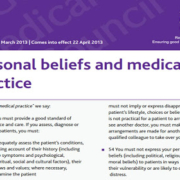The case of Sarah Kuteh: what does it tell us about evangelism and spiritual care?
 Another story of a nurse sacked for praying with patients and talking about Jesus has hit the headlines in the last few days. It does seem to be a recurring theme!
Another story of a nurse sacked for praying with patients and talking about Jesus has hit the headlines in the last few days. It does seem to be a recurring theme!
The facts of the case are a bit sketchy. Sarah Kuteh, who has 15 years of nursing experience, was dismissed by her employers, the Dartford and Gravesham NHS Trust, in August of this year. Her main case against her employer is that she was not allowed witnesses in her defence and was only shown brief, handwritten notes from colleagues rather than a formal complaint, and that the whole process was badly handled.
Her defence of her own actions seems to be that she had always asked permission, raising (rightly) religious belief as part of her patient assessment (it is part of the standard nursing assessment, and spiritual and religious care are part of nursing).
We have not seen all the details of the all the accusations against her (allegedly one patient complained she had given her a Bible, another that she had felt she was imposing her beliefs upon him/her, but this is only reported and second had information). Nor have we seen her direct defence against each charge, so it is hard to be certain who is in the wrong here. It is not persecution for sure, but it could be either an appropriate (if possibly mishandled) response to someone repeatedly going beyond professional guidelines, or an overreaction by her employers to reported accusations.
Either way, it shows that Theresa May’s assertion last month that ‘Christians should not be afraid of speaking “freely” about their faith at work and in public places’ is not as clear cut as it seems. When it comes to patient care, it would seem that there is still a grey area between appropriate spiritual care, freedom of speech, coercion and proselytism.
The professional code of conduct from the Nursing and Midwifery Council (the NMC Code) [section 20.7] makes it clear to nurses that they should ‘not express [their] personal beliefs (including political, religious or moral beliefs) to people in an inappropriate way.’ It does not say not to express them. So there is a grey area around what constitutes an ‘appropriate’ way to express ones beliefs as a health professional.
At the same time the NMC makes clear in section 3 of the Code that nurses should ‘Make sure that people’s physical, social and psychological needs are assessed and responded to.’ It is interesting, as we have pointed out before, that there is no mention of spiritual needs here, an issue that many nurses have questioned (especially as earlier drafts of the Code during the consultative stages did mention spiritual needs).
The Royal College of Nursing (RCN) on the other hand does see spiritual care as an integral part of nursing, and has produced guidelines and resources.
However, it should also be pointed out that attending to the spiritual needs of your patients is not the same thing as proselytising. Spiritual concerns are a part of everyday life. For some people this may be related to faith and religion, while for others it may be about whatever it is that enables them to make sense of life generally.
Often it is when life becomes particularly disrupted that spiritual concerns are raised. Illness breaks down the ordinary, everyday cushions of work, home, family and routine. Who am I? Why am I here? Is this all there is to life? Why am I suffering? People look for connections, meaning, purpose and forgiveness or reconciliation when faced with illness, disability or death.
Patients may look to nurses or doctors to discuss such existential matters. They want us to be genuine and honest; for us to support them as individuals without condemnation. Our behaviour and attitudes are often more important to patients than having the ‘right’ answers.
Spiritual care is patient focussed care, and it may include discussions about prayer and religious needs, although it does not have to. To raise a question with a patient about their beliefs, and whether they want any spiritual support is appropriate care. The problem is when this can be seen as intrusive and pushy. This is the difficult, grey area so many Christian health professionals have run up against.
In a way, there should be no conflict here for Christians. We are told very clearly to be witnesses and to be making disciples of Jesus as we go about our daily business, but we are also reminded to do so with kindness, permission and respect.
We should therefore be ready to answer questions about what we believe, but certainly not to be ‘pushing’ our beliefs on others. Our witness is to who Jesus is and what he has done and is still doing in the world – this is as much in our actions and attitudes, as in our words. We open the doors for conversation, but leave the other person to walk through that door only if they want to. Our priority should always be the needs of our patient.
Good spiritual care is therefore firstly be about listening and asking the right questions. But if and when a patient (or colleague) asks a question about our faith, we should not be afraid to explore with them what they really want to know about our own beliefs. This is appropriate discussion of beliefs, and is part of ensuring that the spiritual, as well as physical, social and psychological needs of our patients are being met.
We do not know all the details in Sarah Kuteh’s case, but we do pray that she and her former employer can reach a just resolution to the situation. But such cases should not make us think that we cannot talk about faith. Rather it should remind us to do so with grace, kindness, permission and respect.












Leave a Reply
Want to join the discussion?Feel free to contribute!